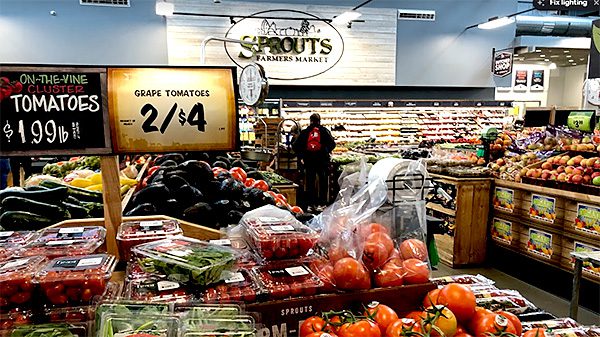The Philadelphia Sprouts Farmers Market is one of the largest in the company’s portfolio. CEO Jack Sinclair says stores going forward likely will have a smaller footprint. (Photo by Pamela Riemenschneider)
Phoenix-based Sprouts Farmers Market BB #:168563 CEO Jack Sinclair saw a lot of stores in his first 100 days on the job.
“After a hundred days, I’m firmly of the belief that overcoming our challenges is within our own control,” he said, during the company’s 3rd quarter earnings report on Oct. 30.
Store footprint increased slightly, but at a significantly higher cost to build and operate, with negligible benefit for the size and expense.
“Interestingly, our smaller stores tend to be more productive than our larger stores,” Sinclair said. “Our fresh sales distribution works effectively when we have density. Where we don’t, it is suboptimal, which creates shrink and cost inefficiency.”
Going forward, Sinclair said, Sprouts will have a more “coordinated and concentrated” expansion of the store network. The company has expanded rapidly over the past few years, with 340 stores in 22 states across the country.
It’s time to tap the brakes, Sinclair said.
“As we evaluate and potentially modify our store format, we’re going to slightly slow growth to approximately 20 store openings in 2020,” he said. “This selection will include stores that are already in flight and/or in premiere locations.”
Sprouts expects to return to its previous growth trajectory in 2021, after the strategy reset.
“This is a new chapter for Sprouts, and I’m energized by the opportunities still to be implemented and convinced we can control our destiny.”
Read the full earnings release here.
Phoenix-based Sprouts Farmers Market BB #:168563 CEO Jack Sinclair saw a lot of stores in his first 100 days on the job.
“After a hundred days, I’m firmly of the belief that overcoming our challenges is within our own control,” he said, during the company’s 3rd quarter earnings report on Oct. 30.
Store footprint increased slightly, but at a significantly higher cost to build and operate, with negligible benefit for the size and expense.
“Interestingly, our smaller stores tend to be more productive than our larger stores,” Sinclair said. “Our fresh sales distribution works effectively when we have density. Where we don’t, it is suboptimal, which creates shrink and cost inefficiency.”
Going forward, Sinclair said, Sprouts will have a more “coordinated and concentrated” expansion of the store network. The company has expanded rapidly over the past few years, with 340 stores in 22 states across the country.
It’s time to tap the brakes, Sinclair said.
“As we evaluate and potentially modify our store format, we’re going to slightly slow growth to approximately 20 store openings in 2020,” he said. “This selection will include stores that are already in flight and/or in premiere locations.”
Sprouts expects to return to its previous growth trajectory in 2021, after the strategy reset.
“This is a new chapter for Sprouts, and I’m energized by the opportunities still to be implemented and convinced we can control our destiny.”
Read the full earnings release here.
Pamela Riemenschneider is the Retail Editor for Blue Book Services.



